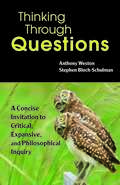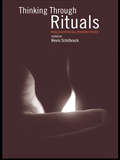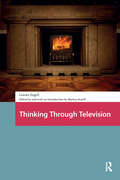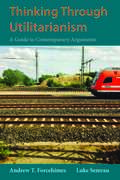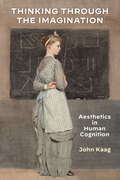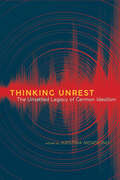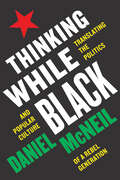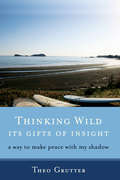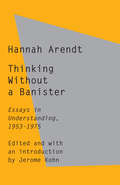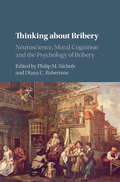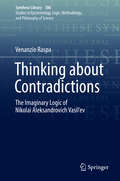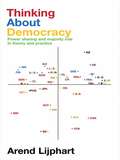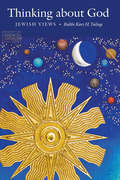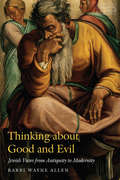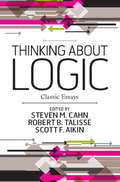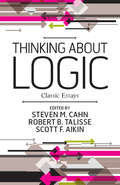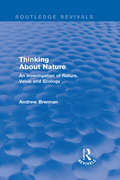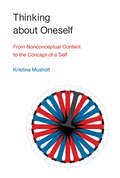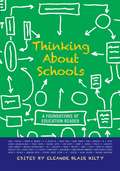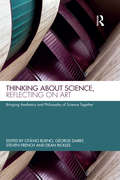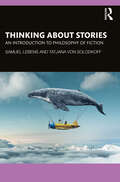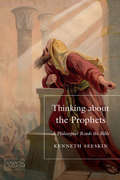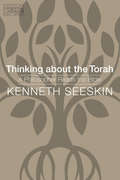- Table View
- List View
Thinking Through Questions: A Concise Invitation to Critical, Expansive, and Philosophical Inquiry
by Anthony Weston Stephen Bloch-SchulmanThinking Through Questions is an accessible and compact guide to the art of questioning, covering both the use and abuse of questions. Animated by wide-ranging and engaging exercises and examples, the book helps students deepen their understanding of how questions work and what questions do, and builds the skills needed to ask better questions. Cowritten by two of today's leading philosopher-teachers, Thinking Through Questions is specifically designed to complement, connect, and motivate today&’s standard curricula, especially for classes in critical thinking, philosophical questioning, and creative problem- solving (called here "expansive questioning"). Offering students a wide and appreciative look at questions and questioning, this small book will also appeal to faculty and students across the disciplines: in college writing courses, creativity workshops, education schools, introductions to college thinking, design thinking projects, and humanities and thinking classes. Open-ended, creative, and critically self-possessed thinking is its constant theme—what field doesn&’t need more of that?
Thinking Through Rituals: Philosophical Perspectives
by Kevin SchilbrackMany philosophical approaches today seek to overcome the division between mind and body. If such projects succeed, then thinking is not restricted to the disembodied mind, but is in some sense done through the body. From a post-Cartesian perspective, then, ritual activities that discipline the body are not just thoughtless motions, but crucial parts of the way people think.Thinking Through Rituals explores religious ritual acts and their connection to meaning and truth, belief, memory, inquiry, worldview and ethics. Drawing on philosophers such as Foucault, Merleau-Ponty and Wittgenstein, and sources from cognitive science, pragmatism and feminist theory, it provides philosophical resources for understanding religious ritual practices like the Christian Eucharistic ceremony, Hatha Yoga, sacred meditation or liturgical speech. Its essays consider a wide variety of rituals in Christianity, Judaism, Hinduism and Buddhism - including political protest rituals and gay commitment ceremonies, traditional Vedic and Yogic rites, Christian and Buddhist meditation and the Jewish Shabbat. They challenge the traditional disjunction between thought and action, showing how philosophy can help to illuminate the relationship between doing and meaning which ritual practices imply.
Thinking Through Television (Televisual Culture)
by Lorenz EngellMedia philosophy can only be found and revealed in media themselves. The essays collected in this volume thus approach television as a medium both of thought and of action in its own right. Through its specific forms and practices, television implements and reflects on aspects of time, such as synchronicity and succession, seriality and event, history and memory. Additionally, television stages new forms of thinking causality and agency, subject-object relations, tactility, choice, and other founding concepts of everyday experience as well as of outstanding philosophical relevance. In the course of media evolution, television organizes the transition from the analogue to the digital. Last not least, by conceiving of itself, television offers a source of finally thinking through television.
Thinking Through Utilitarianism: A Guide to Contemporary Arguments
by Andrew T. Forcehimes Luke SemrauThinking Through Utilitarianism: A Guide to Contemporary Arguments offers something new among texts elucidating the ethical theory known as Utilitarianism. Intended primarily for students ready to dig deeper into moral philosophy, it examines, in a dialectical and reader-friendly manner, a set of normative principles and a set of evaluative principles leading to what is perhaps the most defensible version of Utilitarianism. With the aim of laying its weaknesses bare, each principle is serially introduced, challenged, and then defended. The result is a battery of stress tests that shows with great clarity not only what is attractive about the theory, but also where its problems lie. It will fascinate any student ready for a serious investigation into what we ought to do and what is of value.
Thinking Through the Imagination: Aesthetics in Human Cognition (American Philosophy)
by John KaagUse your imagination! The demand is as important as it is confusing. What is the imagination? What is its value? Where does it come from? And where is it going in a time when even the obscene mseems overdone and passé?This book takes up these questions and argues for the centrality of imagination in humanmcognition. It traces the development of the imagination in Kant’s critical philosophy (particularly the Critique of Aesthetic Judgment) and claims that the insights of Kantian aesthetic theory, especially concerning the nature of creativity, common sense, and genius, influenced the development of nineteenth-century American philosophy.The book identifies the central role of the imagination in the philosophy of Peirce, a role often overlooked in analytic treatments of his thought. The final chapters pursue the observation made by Kant and Peirce that imaginative genius is a type of natural gift (ingenium) and must in some way be continuous with the creative force of nature. It makes this final turn by way of contemporary studies of metaphor, embodied cognition, and cognitive neuroscience.
Thinking Unrest: The Unsettled Legacy of German Idealism (SUNY series, Intersections: Philosophy and Critical Theory)
by Kristina MendicinoReconsiders major thinkers and works of German Idealism and their legacy for our own restless times.From the longing in which Schelling based human freedom to the "restlessness of the negative" that Jean-Luc Nancy famously traced through Hegel's corpus, unrest centrally preoccupied many thinkers associated with German Idealism. Thinking Unrest gathers original essays from eight leading scholars to reopen the question of what moves thought both within German Idealism and among the movement’s heirs. Through readings of Fichte, Hegel, Hölderlin, Novalis, and Schelling, as well as more contemporary writers such as Nicolas Abraham, Ernst Bloch, Antonio Gramsci, and Rainer Maria Rilke, contributors expose more broadly what it may mean for philosophy to be a matter of responding to that which provokes, troubles, and withdraws from thought. Drawing on various theoretical perspectives—poststructuralism, psychoanalysis, the history of science, political theory—the volume reconsiders the legacy of German Idealism for thinking unrest today.
Thinking While Black: Translating the Politics and Popular Culture of a Rebel Generation
by Daniel McNeilThinking While Black brings together the work and ideas of the most notorious film critic in America, one of the most influential intellectuals in the United Kingdom, and a political and cultural generation that consumed images of rebellion and revolution around the world as young Black teenagers in the late 1960s. Drawing on hidden and little known archives of resistance and resilience, it sheds new light on the politics and poetics of young people who came together, often outside of conventional politics, to rock against racism in the 1970s and early ‘80s. It re-examines debates in the 1980s and ‘90s about artists who “spread out” to mount aggressive challenges to a straight, white, middle-class world, and entertainers who “sold out” to build their global brands with performances that attacked the Black poor, rejected public displays of introspection, and expressed unambiguous misogyny and homophobia. Finally, it thinks with and through the work of writers who have been celebrated and condemned as eminent intellectuals and curmudgeonly contrarians in the twenty-first century. In doing so, it delivers the smartest and most nuanced investigation into thinkers such as Paul Gilroy and Armond White as they have evolved from “young soul rebels” to “middle-aged mavericks” and “grumpy old men,” lamented the debasement and deskilling of Black film and music in a digital age, railed against the discourteous discourse and groupthink of screenies and Internet Hordes, and sought to stimulate some deeper and fresher thinking about racism, nationalism, multiculturalism, political correctness and social media. Listen along with this Spotify playlist inspired by the book! For copyright reasons, this book is available in the U.S.A only.
Thinking Wild: Its Gifts of Insight - A Way to Make Peace with My Shadow
by Theo GrutterTheo Grutter is a big, friendly bear of an unpretentious, spontaneous outdoorsman. Born and educated mostly in Switzerland to enter the corporate world, he soon discovered that this life wasn't for him. He moved to Paris and married Clara, a concert pianist. They landed in New York to search for a lifestyle more to their liking in which to raise a family, which soon grew to include five children. They lived in many places, finally settling in a small Mexican Pacific coast fishing village in winter and traveling up to Sitka, Alaska in the summers, where Theo still fishes as a solitary commercial fisherman. Theo and Clara took yearly walkabouts in many exotic countries of the world, with Theo ever observing, learning, and writing about how life works on Earth. Thinking Wild is the fruit of twelve years' work, a series of essays carved in Theo's non-native and poetic English, written by a remarkable man with deep insight, a fisher philosopher, a seer and seeker railing against man's disrespect of other lifeforms on Earth. All is shared by a man who sees his life as his work of art, and treads a path towards a new way of seeing life more lovingly.
Thinking Without a Banister: Essays in Understanding, 1953-1975
by Hannah Arendt Jerome KohnHannah Arendt was born in Germany in 1906 and lived in America from 1941 until her death in 1975. Thus her life spanned the tumultuous years of the twentieth century, as did her thought. She did not consider herself a philosopher, though she studied and maintained close relationships with two great philosophers—Karl Jaspers and Martin Heidegger—throughout their lives. She was a thinker, in search not of metaphysical truth but of the meaning of appearances and events. She was a questioner rather than an answerer, and she wrote what she thought, principally to encourage others to think for themselves. Fearless of the consequences of thinking, Arendt found courage woven in each and every strand of human freedom. In 1951 she published The Origins of Totalitarianism, in 1958 The Human Condition, in 1961 Between Past and Future, in 1963 On Revolution and Eichmann in Jerusalem, in 1968 Men in Dark Times, in 1970 On Violence, in 1972 Crises of the Republic, and in 1978, posthumously, The Life of the Mind. Starting at the turn of the twenty-first century, Schocken Books has published a series of collections of Arendt’s unpublished and uncollected writings, of which Thinking Without a Banister is the fifth volume. The title refers to Arendt’s description of her experience of thinking, an activity she indulged without any of the traditional religious, moral, political, or philosophic pillars of support. The book’s contents are varied: the essays, lectures, reviews, interviews, speeches, and editorials, taken together, manifest the relentless activity of her mind as well as her character, acquainting the reader with the person Arendt was, and who has hardly yet been appreciated or understood. (Edited and with an introduction by Jerome Kohn)
Thinking about Bribery: Neuroscience, Moral Cognition and the Psychology of Bribery
by Nichols Philip M. Robertson Diana C.Bribery is perhaps the most visible and most frequently studied form of corruption. Very little research, however, examines the individual decision to offer or accept a bribe, or how understanding that decision can help to effectively control bribery. This book brings together research by scholars from a variety of disciplines studying the mind and morality, who use their research to explain how and why decisions regarding participation in bribery are made. It first examines bribery from the perspective of brain structure, then approaches the decision to engage in bribery from a cognitive perspective. It examines the psychological costs imposed on a person who engages in bribery, and studies societal and organizational norms and their impact on bribery. This is an ideal read for scholars and other interested persons studying business ethics, bribery and corruption, corruption control, and the applications of neuroscience in a business environment.
Thinking about Contradictions: The Imaginary Logic of Nikolai Aleksandrovich Vasil’ev (Synthese Library #386)
by Venanzio RaspaThis volume examines the entire logical and philosophical production of Nicolai A. Vasil'ev, studying his life and activities as a historian and man of letters. Readers will gain a comprehensive understanding of this influential Russian logician, philosopher, psychologist, and poet. The author frames Vasil'ev's work within its historical and cultural context. He takes into consideration both the situation of logic in Russia and the state of logic in Western Europe, from the end of the 19th century to the beginning of the 20th. Following this, the book considers the attempts to develop non-Aristotelian logics or ideas that present affinities with imaginary logic. It then looks at the contribution of traditional logic in elaborating non-classical ideas. This logic allows the author to deal with incomplete objects just as imaginary logic does with contradictory ones. Both logics are objects of interesting analysis by modern researchers. This volume will appeal to graduate students and scholars interested not only in Vasil'ev's work, but also in the history of non-classical logics.
Thinking about Democracy: Power Sharing and Majority Rule in Theory and Practice
by Arend LijphartArend Lijphart is one of the world's leading and most influential political scientists whose work has had a profound impact on the study of democracy and comparative politics. Thinking about Democracy draws on a lifetime's experience of research and publication in this area and collects together for the first time his most significant and influential work. The book also contains an entirely new introduction and conclusion where Professor Lijphart assesses the development of his thought and the practical impact it has had on emerging democracies. This volume will be of enormous interest to all students and scholars of democracy and comparative politics, and politics and international relations in general.
Thinking about Free Will
by Peter Van InwagenPeter van Inwagen, author of the classic book An Essay on Free Will (1983), has established himself over the last forty years as a leading figure in the philosophical debate about the problem of free will. This volume presents eleven influential essays from throughout his career, as well as two new and previously unpublished essays, 'The Problem of Fr** W*ll' and 'Ability'. The essays include discussions of determinism, moral responsibility, 'Frankfurt counterexamples', the meaning of 'the ability to do otherwise', and the very definition of free will, as well as critiques of writings on the topic by Daniel Dennett and David Lewis. An introduction by the author discusses the history of his thinking about free will. The volume will be a valuable resource for those looking to engage with van Inwagen's significant contributions to this perennially important topic.
Thinking about God: Jewish Views (JPS Essential Judaism)
by Rabbi Kari H. TulingWho—or what—is God? Is God like a person? Does God have a gender? Does God have a special relationship with the Jewish people? Does God intervene in our lives? Is God good—and, if yes, why does evil persist in the world? In investigating how Jewish thinkers have approached these and other questions, Rabbi Kari H. Tuling elucidates many compelling—and contrasting—ways of thinking about God in Jewish tradition.Thinking about God addresses the genuinely intertextual nature of evolving Jewish God concepts. Just as in Jewish thought the Bible and other historical texts are living documents, still present and relevant to the conversation unfolding now, and just as a Jewish theologian examining a core concept responds to the full tapestry of Jewish thought on the subject all at once, this book is organized topically, covers Jewish sources (including liturgy) from the biblical to the postmodern era, and highlights the interplay between texts over time, up through our own era. A highly accessible resource for introductory students, Thinking about God also makes important yet challenging theological texts understandable. By breaking down each selected text into its core components, Tuling helps the reader absorb it both on its own terms and in the context of essential theological questions of the ages. Readers of all backgrounds will discover new ways to contemplate God. Access a study guide.
Thinking about Good and Evil: Jewish Views from Antiquity to Modernity (JPS Essential Judaism)
by Rabbi Wayne AllenThe most comprehensive book on the topic, Thinking about Good and Evil traces the most salient Jewish ideas about why innocent people seem to suffer, why evil individuals seem to prosper, and God&’s role in such matters of (in)justice, from antiquity to the present. Starting with the Bible and Apocrypha, Rabbi Wayne Allen takes us through the Talmud; medieval Jewish philosophers and Jewish mystical sources; the Ba&’al Shem Tov and his disciples; early modern thinkers such as Spinoza, Mendelssohn, and Luzzatto; and, finally, modern thinkers such as Cohen, Buber, Kaplan, and Plaskow. Each chapter analyzes individual thinkers&’ arguments and synthesizes their collective ideas on the nature of good and evil and questions of justice. Allen also exposes vastly divergent Jewish thinking about the Holocaust: traditionalist (e.g., Ehrenreich), revisionist (e.g., Rubenstein, Jonas), and deflective (e.g., Soloveitchik, Wiesel). Rabbi Allen&’s engaging, accessible volume illuminates well-known, obscure, and novel Jewish solutions to the problem of good and evil.
Thinking about Logic
by Steven M. Cahn Robert B. Talisse Scott F. AikinThinking about Logic is an accessible and thought-provoking collection of classic articles in the philosophy of logic. An ideal companion to any formal logic course or textbook, this volume illuminates how logic relates to perennial philosophical issues about knowledge, meaning, rationality, and reality. The editors have selected each essay for its brevity, clarity, and impact and have included insightful introductions and discussion questions. The puzzles raised will help readers acquire a more thorough understanding of fundamental logic concepts and a firmer command of the connections between formal logic and other areas of philosophical study: epistemology, philosophy of language, philosophy of science, and metaphysics.
Thinking about Logic: Classic Essays
by Steven M. CahnThinking about Logic is an accessible and thought-provoking collection of classic articles in the philosophy of logic. An ideal companion to any formal logic course or textbook, this volume illuminates how logic relates to perennial philosophical issues about knowledge, meaning, rationality, and reality. The editors have selected each essay for its brevity, clarity, and impact and have included insightful introductions and discussion questions. The puzzles raised will help readers acquire a more thorough understanding of fundamental logic concepts and a firmer command of the connections between formal logic and other areas of philosophical study: epistemology, philosophy of language, philosophy of science, and metaphysics.
Thinking about Nature: An Investigation of Nature, Value and Ecology (Routledge Revivals)
by Andrew BrennanEcology – unlike astronomy, physics, or chemistry – is a science with an associated political and ethical movement: the Green Movement. As a result, the ecological position is often accompanied by appeals to holism, and by a mystical quasi-religious conception of the ecosystem. In this title, first published in 1988, Andrew Brennan argues that we can reduce much of the mysticism surrounding ecological discussions by placing them within a larger context, and illustrating that our individual interests are bound with larger, community interests. Using an interdisciplinary approach, which bridges the gap between the sciences, philosophy, and ethics, this is an accessible title, which will be of particular value to students with an interest in the philosophy of environmental science and ethics.
Thinking about Oneself: From Nonconceptual Content to the Concept of a Self (The\mit Press Ser.)
by Kristina MusholtA novel theory of self-consciousness and its development that integrates philosophical considerations with recent findings in the empirical sciences.In this book, Kristina Musholt offers a novel theory of self-consciousness, understood as the ability to think about oneself. Traditionally, self-consciousness has been central to many philosophical theories. More recently, it has become the focus of empirical investigation in psychology and neuroscience. Musholt draws both on philosophical considerations and on insights from the empirical sciences to offer a new account of self-consciousness—the ability to think about ourselves that is at the core of what makes us human. Examining theories of nonconceptual content developed in recent work in the philosophy of cognition, Musholt proposes a model for the gradual transition from self-related information implicit in the nonconceptual content of perception and other forms of experience to the explicit representation of the self in conceptual thought. A crucial part of this model is an analysis of the relationship between self-consciousness and intersubjectivity. Self-consciousness and awareness of others, Musholt argues, are two sides of the same coin. After surveying the philosophical problem of self-consciousness, the notion of nonconceptual content, and various proposals for the existence of nonconceptual self-consciousness, Musholt argues for a non-self-representationalist theory, according to which the self is not part of the representational content of perception and bodily awareness but part of the mode of presentation. She distinguishes between implicitly self-related information and explicit self-representation, and describes the transitions from the former to the latter as arising from a complex process of self–other differentiation. By this account, both self-consciousness and intersubjectivity develop in parallel.
Thinking about Schools
by Eleanor Blair HiltyHilty collects dozens of classic and contemporary essays designed to engage students and encourage critical thinking and discussion on topics relating to schools and education. The book is divided into five parts. Part I discusses the aims and purposes of education, part II the content of the curriculum, part III the roles and responsibilities of teachers, part IV the roles and responsibilities of students, and part V the issues that impact 21st century schools. Each part includes an introduction, discussion questions, a guide to further reading and related resources. Annotation ©2011 Book News, Inc. , Portland, OR (booknews. com)
Thinking about Schools
by Eleanor Blair HiltyDesigned specifically for students with little or no education background, Thinking About Schools is an essential collection of classic and contemporary readings that provides a complete, balanced overview of educational foundations. Anchored in classic scholarship from the 1960s to today, this book also incorporates a number of thought-provoking popular essays that will engage students and encourage critical thinking about vital issues concerning the purpose of education, curriculum content, the roles and responsibilities of students and teachers, and new directions for education in the twenty-first century. In addition to selecting each reading for its impact and accessibility, editor Eleanor Blair Hilty further promotes student comprehension by including introductions, discussion questions, guides to further reading, and related resources for each of the five parts.
Thinking about Science, Reflecting on Art: Bringing Aesthetics and Philosophy of Science Together
by Otávio Bueno Dean Rickles Steven French George DarbyThinking about Science, Reflecting on Art: Bringing Aesthetics and Philosophy of Science Together is the first book to systematically examine the relationship between the philosophy of science and aesthetics. With contributions from leading figures from both fields, this edited collection engages with such questions as: Does representation function in the same way in science and in art? What important characteristics do scientific models share with literary fictions? What is the difference between interpretation in the sciences and in the arts? Can there be a science of aesthetics? In what ways can aesthetics and philosophy of science be integrated? Aiming to develop the interconnections between the philosophy of science and the philosophy of art more broadly and more deeply than ever before, this volume not only explores scientific representation by comparison with fiction but extends the scope of interaction to include metaphysical and other questions around methodology in mainstream philosophy of science, including the aims of science, the characterisation of scientific understanding, and the nature of observation, as well as drawing detailed comparisons between specific examples in both art and the sciences.
Thinking about Stories: An Introduction to Philosophy of Fiction
by Samuel Lebens Tatjana von SolodkoffThinking About Stories is a fun and thought-provoking introduction to philosophical questions about narrative fiction in its many forms, from highbrow literature to pulp fiction to the latest shows on Netflix. Written by philosophers Samuel Lebens and Tatjana von Solodkoff, it engages with fundamental questions about fiction, such as: What is it? What does it give us? Does a story need a narrator? And why do sad stories make us cry if we know they aren’t real? The format of the book emulates a lively, verbal exchange: each chapter has only one author while the other appears spontaneously in dialogues in the text along the way, raising questions and voicing criticisms, and inviting responses from their co-author. This unique format allows readers to feel like they are a part of the conversation about the philosophical foundations of some of the fictions in their own lives. Key Features Draws on a wide range of types of narrative fiction, from Harry Potter to Breakfast of Champions to Parks and Recreation. Explores how fiction, despite its detachment from truth, is often best able to teach us important things about the world in which we live. Concludes by asking in the final chapter whether we all might be fictions. Includes bibliographies and suggested reading lists in each chapter.
Thinking about the Prophets: A Philosopher Reads the Bible (JPS Essential Judaism)
by Kenneth SeeskinRethinking the great literary prophets whose ministry ran from the eighth to the sixth centuries BCE—Amos, Hosea, First Isaiah, Jeremiah, Ezekiel, Second Isaiah, and Job—Thinking about the Prophets examines their often-shocking teachings in light of their times, their influence on later Western and Jewish thinkers, and their enduring lessons for all of us. As a noted scholar of Jewish philosophy, Kenneth Seeskin teases out philosophical, ethical, and theological questions in the writings, such as the nature of moral reasoning, the divine persona, divine providence, the suffering of the innocent, the power of repentance, and what it means to believe in a monotheistic conception of God. Seeskin demonstrates that great ideas are not limited by time or place, but rather once put forth, take on a life of their own. Thus he interweaves the medieval and modern philosophers Maimonides, Kant, Cohen, Buber, Levinas, Heschel, and Soloveitchik, all of whom read the prophets and had important things to say as a result. We come to see the prophets perhaps in equal measure as divinely authorized whistle-blowers and profound thinkers of the human condition. Readers of all levels will find this volume an accessible and provoking introduction to the enduring significance of biblical prophecy.
Thinking about the Torah: A Philosopher Reads the Bible (JPS Essential Judaism)
by Kenneth SeeskinThe Bible is an enduring source of inspiration for the human heart and mind, and readers of Thinking about the Torah will be rewarded with an enhanced understanding of this great work’s deeper meanings. Drawing on Western philosophy and particularly Jewish philosophy, Kenneth Seeskin delves into ten core biblical verses and the powerful ideas that emerge from them. He speaks to readers on every page and invites conversation about topics central to human existence: how finite beings can relate to the infinite, what love is, the role of ethics in religion, and the meaning of holiness. Seeskin raises questions we all ask and responds to them with curiosity and compassion, weaving into his own perceptive commentary insights from great Jewish thinkers such as Maimonides, Spinoza, Buber, Rosenzweig, and Levinas, as well as Plato, Aristotle, Augustine, Luther, Kant, and Kierkegaard. The Bible is concerned with how we think as well as how we follow the commandments, rituals, and customs. Seeskin inspires us to read the Torah with an open mind and think about the lessons it teaches us.
